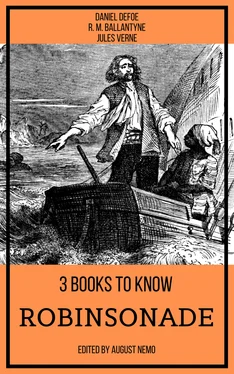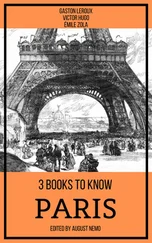At last the long and tedious day came to a close, the sun sank into the sea, and the short-lived twilight of those regions, to which I have already referred, ended abruptly in a dark night. Hastily throwing a few blankets into our little boat, we stepped into it, and whispering farewell to the natives in the schooner, rowed gently over the lagoon, taking care to keep as near to the beach as possible. We rowed in the utmost silence and with muffled oars, so that had any one observed us at the distance of a few yards, he might have almost taken us for a phantom boat or a shadow on the dark water. Not a breath of air was stirring; but fortunately the gentle ripple of the sea upon the shore, mingled with the soft roar of the breaker on the distant reef, effectually drowned the slight plash that we unavoidably made in the water by the dipping of our oars.
A quarter of an hour sufficed to bring us to the overhanging cliff under whose black shadow our little canoe lay, with her bow in the water, ready to be launched, and most of her cargo already stowed away. As the keel of our little boat grated on the sand, a hand was laid upon the bow, and a dim form was seen.
“Ha!” said Peterkin in a whisper as he stepped upon the beach; “is that you, Avatea?”
“Yis, it am me,” was the reply.
“All right — Now, then, gently — Help me to shove off the canoe,” whispered Jack to the teacher. —“And, Peterkin, do you shove these blankets aboard; we may want them before long. — Avatea, step into the middle: that’s right.”
“Is all ready?” whispered the teacher.
“Not quite,” replied Peterkin. —“Here, Ralph, lay hold o’ this pair of oars, and stow them away if you can. I don’t like paddles. After we’re safe away, I’ll try to rig up rowlocks for them.”
“Now, then, in with you and shove off!”
One more earnest squeeze of the kind teacher’s hand, and with his whispered blessing yet sounding in our ears, we shot like an arrow from the shore, sped over the still waters of the lagoon, and paddled as swiftly as strong arms and willing hearts could urge us over the long swell of the open sea.
All that night and the whole of the following day we plied our paddles in almost total silence and without a halt, save twice to recruit our failing energies with a mouthful of food and a draught of water. Jack had taken the bearing of the island just after starting, and laying a small pocket-compass before him, kept the head of the canoe due south, for our chance of hitting the island depended very much on the faithfulness of our steersman in keeping our tiny bark exactly and constantly on its proper course. Peterkin and I paddled in the bow, and Avatea worked untiringly in the middle.
As the sun’s lower limb dipped on the gilded edge of the sea Jack ceased working, threw down his paddle, and called a halt.
“There!” he cried, heaving a deep, long-drawn sigh; “we’ve put a considerable breadth of water between us and these black rascals, so now we’ll have a hearty supper and a sound sleep.”
“Hear, hear!” cried Peterkin. “Nobly spoken, Jack! — Hand me a drop of water, Ralph. — Why, girl, what’s wrong with you? You look just like a black owl blinking in the sunshine!”
Avatea smiled. “I sleepy,” she said; and as if to prove the truth of this, she laid her head on the edge of the canoe and fell fast asleep.
“That’s uncommon sharp practice,” said Peterkin with a broad grin. “Don’t you think we should awake her to make her eat something first? Or perhaps,” he added with a grave, meditative look —“perhaps we might put some food in her mouth, which is so elegantly open at the present moment, and see if she’d swallow it while asleep. — If so, Ralph, you might come round to the front here and feed her quietly, while Jack and I are tucking into the victuals. It would be a monstrous economy of time.”
I could not help smiling at Peterkin’s idea, which indeed, when I pondered it, seemed remarkably good in theory; nevertheless, I declined to put it in practice, being fearful of the result should the victuals chance to go down the wrong throat. But on suggesting this to Peterkin, he exclaimed:
“Down the wrong throat, man! Why, a fellow with half-an-eye might see that if it went down Avatea’s throat it could not go down the wrong throat! — unless, indeed, you have all of a sudden become inordinately selfish, and think that all the throats in the world are wrong ones except your own. However, don’t talk so much, and hand me the pork before Jack finishes it. I feel myself entitled to at least one minute morsel.”
“Peterkin, you’re a villain — a paltry little villain!” said Jack quietly as he tossed the hind legs (including the tail) of a cold roast pig to his comrade; “and I must again express my regret that unavoidable circumstances have thrust your society upon me, and that necessity has compelled me to cultivate your acquaintance. Were it not that you are incapable of walking upon the water, I would order you, sir, out of the canoe!”
“There! you’ve awakened Avatea with your long tongue,” retorted Peterkin, with a frown, as the girl gave vent to a deep sigh. “No,” he continued, “it was only a snore. Perchance she dreameth of her black Apollo. — I say, Ralph, do leave just one little slice of that yam! Between you and Jack I run a chance of being put on short allowance, if not — yei-a-a-ow!”
Peterkin’s concluding remark was a yawn of so great energy that Jack recommended him to postpone the conclusion of his meal till next morning — a piece of advice which he followed so quickly that I was forcibly reminded of his remark, a few minutes before, in regard to the sharp practice of Avatea.
My readers will have observed, probably, by this time, that I am much given to meditation: they will not, therefore, be surprised to learn that I fell into a deep reverie on the subject of sleep, which was continued without intermission into the night, and prolonged without interruption into the following morning. But I cannot feel assured that I actually slept during that time, although I am tolerably certain that I was not awake.
Thus we lay, like a shadow, on the still bosom of the ocean, while the night closed in, and all around was calm, dark, and silent.
A thrilling cry of alarm from Peterkin startled us in the morning, just as the grey dawn began to glimmer in the east.
“What’s wrong?” cried Jack, starting up.
Peterkin replied by pointing, with a look of anxious dread, towards the horizon; and a glance sufficed to show us that one of the largest-sized war-canoes was approaching us!
With a groan of mingled despair and anger, Jack seized his paddle, glanced at the compass, and in a suppressed voice commanded us to “Give way!” But we did not require to be urged. Already our four paddles were glancing in the water, and the canoe bounded over the glassy sea like a dolphin, while a shout from our pursuers told that they had observed our motions.
“I see something like land ahead,” said Jack in a hopeful tone. “It seems impossible that we could have made the island yet; still, if it is so, we may reach it before these fellows can catch us, for our canoe is light and our muscles are fresh.”
No one replied; for, to say truth, we felt that in a long chase we had no chance whatever with a canoe which held nearly a hundred warriors. Nevertheless, we resolved to do our utmost to escape, and paddled with a degree of vigour that kept us well in advance of our pursuers. The war-canoe was so far behind us that it seemed but a little speck on the sea, and the shouts to which the crew occasionally gave vent came faintly towards us on the morning breeze. We therefore hoped that we should be able to keep in advance for an hour or two, when we might perhaps reach the land ahead. But this hope was suddenly crushed by the supposed land, not long after, rising up into the sky, thus proving itself to be a fog-bank!
Читать дальше












